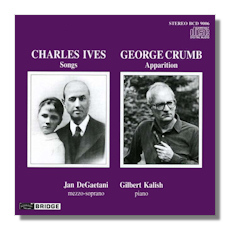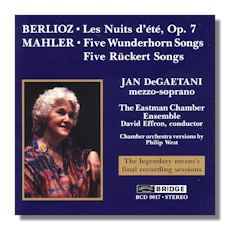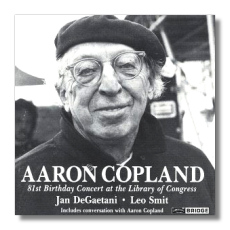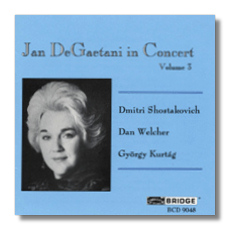
The Internet's Premier Classical Music Source
Related Links
-
Berlioz Reviews
Copland Reviews
Crumb Reviews
Ives Reviews
Mahler Reviews - Latest Reviews
- More Reviews
-
By Composer
-
Collections
DVD & Blu-ray
Books
Concert Reviews
Articles/Interviews
Software
Audio
Search Amazon
Recommended Links
Site News
 CD Review
CD Review
The Remarkable Jan DeGaetani

- Charles Ives: Nine Songs
- George Crumb: Apparition
Jan DeGaetani, mezzo-soprano
Gilbert Kalish, piano
Bridge 9006


- Hector Berlioz: Le Nuits d'été
- Gustav Mahler:
- Five Lieder from Der Knaben Wunderhorn
- Five Rückert Lieder
Jan DeGaetani, mezzo-soprano
Eastman Chamber Ensemble/David Effron
Bridge 9017


The 81st Birthday Concert
- Aaron Copland: Songs
Jan DeGaetani, mezzo-soprano
Leo Smit, piano
Bridge 9046


In Concert, Volume 3
- Dmitri Shostakovich: Songs from Jewish Folk Poetry, Op. 79 1
- Dan Edward Welcher: Abeja Blanca 2
- György Kurtág: Scenes from a Novel 3
Jan DeGaetani, mezzo-soprano
1 Benite Valente, soprano
1 Jon Humphrey, tenor
1,2 Robert Spillman, piano
2 Philip West, English horn
3 Speculum Musicae
Bridge 9048
I've been listening to these four discs with wonderment, admiration, and delight. Jan DeGaetani (1933-90) was a mezzo-soprano with a unique voice, range of repertoire, and persona. She never appeared in opera, knowing that her skills were best suited to the recital stage, and there she reigned supreme in contemporary works, though she also sang much of the standard 19th and early 20th century literature in any number of languages, with equal success in all of them. Her voice was small, light, and exquisitely pure, with perfect intonation, intelligently used for effective communication with her audiences, always with great understanding. She could vary its quality and volume at will, offering an astonishing array of colors and timbres for everything from the rich warmth needed for 19th century Romantic music to the raucous squawks required by some modern material.
All of this is displayed in the discs listed above. The nine varied Ives songs and Crumb's mysterious settings of texts about death from Whitman's "When Lilacs Last in the Doorway Bloom'd" (written for the singer, with her long-time partner Gilbert Kalish providing expert accompaniments), in spite of their strange dissonances, are as sweet and evocative as if they were Schubert lieder, though her voice seems a bit veiled in the former. Others may bring greater opulence and power to Nuits d'été, but nobody sings it in more idiomatic French, and her seamless and subtle legato phrasing and purity of line give it an unparalleled degree of sensuality. She's less successful in Mahler, where she lacks something in strength and vitality, and here the orchestral accompaniment is also weak, though it's fine in the Berlioz.
I'm not fond of Copland's songs, which – even including his major work in this genre, settings of Twelve Poems of Emily Dickinson – seem to me unattractive in their clumsy use of language, jagged harmonies, and unevenly spaced chords. But if you like them, these recordings – from an 81st Birthday Concert at the Library of Congress – are exemplary in their clarity and expressiveness. The disc includes a charming (if brief) conversation between Copland, accompanist Leo Smit, and Donald Leavitt of the Library. And finally, she captures the varied idioms of the Shostakovich, Welcher, and Kurtag songs (sung in Russian, English, and Hungarian) not only with precision but with a depth of understanding and sympathy that is breath-taking.
DeGaetani is much missed, but fortunately, she left us a substantial recorded legacy, most of it originally released by Arabesque and now reissued by Bridge. She was among the finest singers and interpreters of our time, and all of her work is worth hearing.
Copyright © 2000, Alexander Morin





















